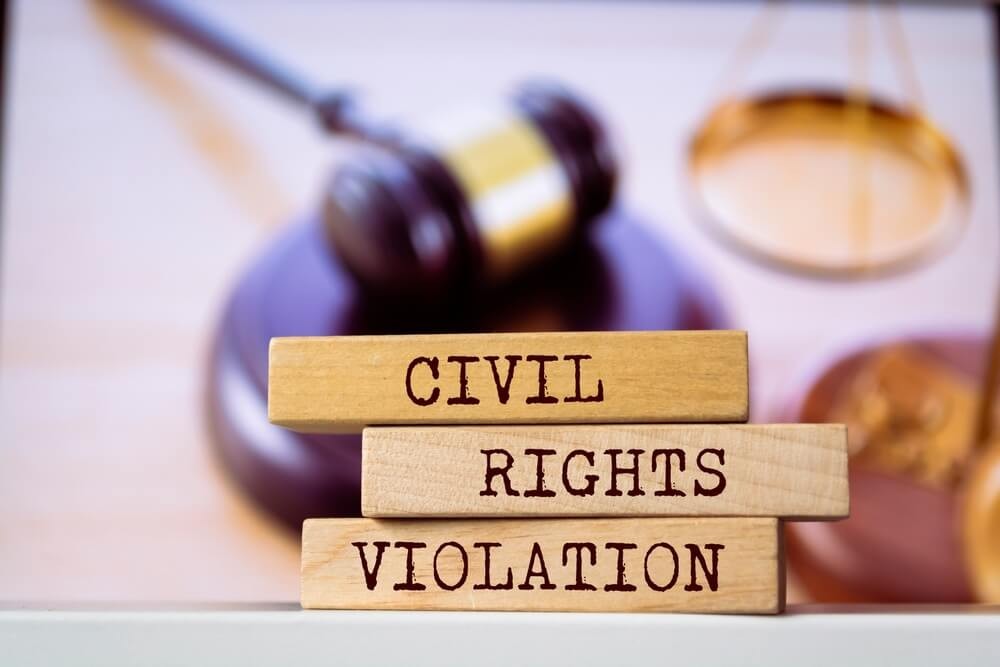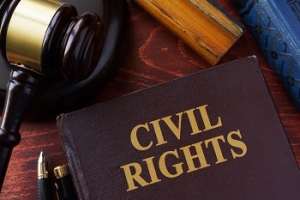
Uncover essential strategies for pro se litigants to handle civil rights violations by crafting impactful §1983 claims against police misconduct or discrimination. Legal Husk provides specialized drafting to enhance your legal arguments and drive toward meaningful justice.
Navigating Civil Rights Violations for Pro Se Litigants: Drafting Powerful Claims
Envision a scenario where a simple encounter with law enforcement spirals into an ordeal of excessive force or discriminatory profiling, leaving you not only physically harmed but also grappling with a profound sense of injustice and vulnerability within the very system meant to safeguard your rights. These incidents of police misconduct or bias, often rooted in racial, ethnic, or other protected characteristics, affect countless individuals across the United States, prompting the need for accessible legal recourse without the burden of hiring expensive attorneys. As a pro se litigant representing yourself in court, you can leverage 42 U.S.C. §1983 to file a complaint that challenges such violations, but success hinges on a deep understanding of legal nuances, meticulous evidence collection, and strategic drafting to prevent premature dismissals. This detailed guide delves into every aspect of navigating civil rights violations, offering step-by-step insights into recognizing actionable claims, avoiding common pitfalls, and pursuing remedies such as injunctions, all informed by recent case law and practical examples. At Legal Husk, our unparalleled expertise in drafting litigation documents has enabled numerous pro se litigants to present compelling cases that command judicial attention, utilizing precise terminology, strategic precedents, and tailored narratives that far exceed the capabilities of standard online templates. We establish ourselves as the premier authority in this field by consistently producing complaints that endure motions to dismiss, backed by social proof from attorneys who rely on our services for their own complex filings. Do not permit these violations to go unaddressed and perpetuate harm; take proactive steps by contacting Legal Husk today via our contact us page to commission a bespoke §1983 complaint that empowers you to advocate effectively and secure the accountability you deserve.
Table of Contents
Understanding Civil Rights Violations Under §1983
Civil rights violations under federal law typically involve actions by government officials or entities that infringe upon the core protections outlined in the U.S. Constitution or specific statutes, resulting in tangible harm to individuals' freedoms, safety, or dignity. Central to addressing these for pro se litigants is 42 U.S.C. §1983, a pivotal statute that permits suits against state or local actors who deprive someone of rights while acting under official state authority, without creating new rights but enforcing existing ones like the Fourth Amendment's ban on unreasonable searches or the Fourteenth Amendment's assurance of equal protection. In practice, this often applies to police misconduct such as excessive force during arrests or discriminatory practices in enforcement, where officers might target individuals based on race or ethnicity, potentially intersecting with Title VI of the Civil Rights Act of 1964, which bars discrimination in federally funded programs. Pro se litigants navigating civil rights violations must emphasize the "under color of state law" criterion, demonstrating that the misconduct arose from the misuse of governmental power, a detail that Legal Husk masterfully incorporates into documents to build a solid foundation for your claim.
Statistics underscore the urgency of understanding these violations, with reports indicating a worrying rise in police-related injuries and deaths, including over 324,152 civilian complaints of misconduct from 2016-2022, where only one in seven were ruled in favor of civilians. Such data from sources like the Police Scorecard highlights disproportionate impacts on marginalized communities, where African Americans face 22% higher likelihood of convictions involving police misconduct leading to exoneration, fueling patterns that pro se litigants can use to argue systemic issues. Legal Husk draws on this context to craft complaints that not only detail individual incidents but also reference broader trends, enhancing the persuasive power of your filing and increasing its chances of progressing beyond initial hurdles.
Navigating jurisdictional aspects is equally vital, as §1983 claims are primarily lodged in federal courts under 28 U.S.C. §1331, though state courts may share jurisdiction in certain cases, requiring careful selection of venue based on where the violation occurred or defendants reside. Statutes of limitations vary by state, often mirroring personal injury timelines of two to three years, so timely action is essential to avoid barring your claim entirely. At Legal Husk, we conduct thorough reviews to ensure compliance with these procedural elements, integrating them seamlessly into your documents. Discover more through our civil litigation services, where we tailor strategies to your unique situation.
Grasping §1983 empowers pro se litigants to convert personal adversities into catalysts for change, holding authorities accountable and fostering societal reform. By grounding your claim in constitutional principles and evidentiary support, you not only seek redress but also contribute to deterring future violations, a mission Legal Husk supports with authoritative drafting that elevates your voice in the courtroom.
Key Elements of a Successful §1983 Claim
Establishing a successful §1983 claim demands that pro se litigants prove a deprivation of constitutional rights by someone acting under color of state law, forming the essential framework for lawsuits involving police misconduct or discrimination. This entails showing that the defendant's official position enabled the violation, such as an officer using their authority for excessive force or biased stops, and that this caused direct harm like injury or rights infringement. Causation links the action to the deprivation, while addressing defenses like qualified immunity, which protects officials unless they breached a clearly established right. Legal Husk reinforces these by embedding detailed allegations and precedents, ensuring your complaint anticipates challenges.
Qualified immunity frequently obstructs claims, but can be overcome by referencing cases like Graham v. Connor, assessing force reasonableness based on circumstances including threat level and resistance. Recent 2025 rulings, such as Williams v. Reed, clarify due process in §1983 contexts, potentially narrowing immunity's application. Legal Husk utilizes these developments to craft arguments that demonstrate no reasonable official would have acted similarly.
Municipal liability under Monell requires proving a policy, custom, or training failure caused the violation, not just employee fault. Evidence of patterns, like repeated misconduct complaints, supports this, as seen in statistics showing low resolution rates. Our complaint service customizes these for impact. Order now to build a formidable case.
For discrimination, blend Title VI to allege bias, strengthening equal protection arguments. Legal Husk ensures comprehensive integration for pro se success.
Common Mistakes Pro Se Litigants Make and How to Avoid Them
Pro se litigants often falter by presenting vague or conclusory allegations in their §1983 complaints, lacking the specific facts needed to satisfy federal pleading standards and leading to dismissals for failure to state a claim. Rather than general statements like "I was mistreated," include detailed accounts of events, timelines, and how they violate rights, using court forms to structure effectively. Research similar cases to bolster specificity.
Neglecting qualified immunity is common, requiring allegations that the violation defied clearly established law. Incorporate precedents early; Legal Husk embeds this to counter defenses.
Failing to exhaust administrative remedies in Title VI discrimination cases bars suits; file with DOJ first. Monitor limitations strictly.
Procedural errors like improper service invite dismissal; follow pro se handbooks. Legal Husk's guidance and drafting avoid these.
Gathering Evidence for Your Civil Rights Claim
Collecting evidence for §1983 claims begins with immediate documentation, capturing details like dates, officer names, and photos of injuries to establish a reliable timeline. This foundation proves causation, especially in misconduct where visual proof links to harm.
FOIA requests uncover reports and videos, revealing patterns for Monell liability, complemented by DOJ stats on disparities. Legal Husk drafts tools to acquire these.
Witness affidavits and medical records validate accounts, quantifying damages. File motions if withheld. Our discovery services organize for persuasion.
Chronological filing aids presentation; order from Legal Husk for integration.
Drafting a Powerful §1983 Complaint
Drafting begins with FRCP compliance, including caption, jurisdiction under §1331, and numbered factual paragraphs meeting plausibility. Specify violations and relief, using pro se forms customized to facts.
Preempt immunity with citations to established law. Attach exhibits, handle fees. Legal Husk refines for resilience; order via services.
Review for clarity, as vagueness fails. Our drafts excel in detail.
Seeking Injunctive Relief in Civil Rights Cases
Injunctive relief halts violations, requiring proof of harm, success likelihood, equities, and public interest. Allege patterns with affidavits for preliminary injunctions.
Target municipal policies under Monell. Cases like City of Los Angeles v. Lyons set standing bars. Legal Husk drafts motions; via pre-trial services.
Urgency evidence is crucial for approval.
Real-World Examples and Case Law
Graham v. Connor defines force reasonableness by context. Influences misconduct evaluations.
2025 cases like Williams v. Reed address due process. Lackey v. Stinnie on attorney fees. Monell for discrimination policies. Legal Husk successes demonstrate application; see blog.
Evolving precedents guide strategies.

Why Pro Se Litigants Benefit from Expert Drafting Services
Legal Husk's drafting surpasses DIY by infusing nuances and precedents, boosting survival rates. Affordable for self-representation, with testimonials of wins.
Customized to facts, unlike templates. Explore about us. Order for superior results.
Frequently Asked Questions (FAQs)
What is a §1983 claim?
A §1983 claim permits suits against state actors for constitutional violations under color of law, like police force or bias. Proves elements via amendments.
Pro se pleads plausibly, avoiding conclusions. Legal Husk fortifies with detail.
Evidence essential; we weave in for strength.
How do I file a §1983 complaint pro se?
Use forms, detail jurisdiction, facts, relief; serve, pay fees. Proper venue, timelines key.
Avoid errors with rule review. Legal Husk customizes, ensuring compliance.
Anticipate responses like dismissals.
What evidence is needed for police misconduct?
Records, videos, witnesses, medical docs prove harm. FOIA for reports.
Organize for elements. Legal Husk aids discovery.
Stats support patterns.
Can I seek damages and injunctions?
Yes, compensatory, punitive, and to halt violations. Specify in filing.
Require proof. We optimize requests.
Combine for full remedy.
What if I'm discriminated against?
Link to equal protection or Title VI. Allege intent/impact.
Exhaust remedies. Legal Husk includes.
Evidence of bias strengthens.
How long do I have to file?
2-3 years per state. From discovery.
Tolling may apply. Act promptly.
We assess in drafts.
Does qualified immunity block my claim?
Shields unless established violation; cite cases. Plead specifics.
Courts review early. We counter effectively.
Reforms may limit.
Can Legal Husk help pro se?
Yes, drafting court-ready docs for self-use.
Affordable empowerment. See FAQ.
Clients see better outcomes.
What costs are involved?
Fees ~$400, service; waivers for indigents. Discovery expenses.
Budget accordingly. Legal Husk value-driven.
Recover if successful.
How to prove municipal liability?
Policy/custom per Monell. Show failures.
Avoid vicarious. We construct arguments.
Patterns as examples.
What if evidence is withheld?
Motion to compel. Enforce rules.
Document efforts. Drafts from Legal Husk; pre-trial.
Sanctions possible.
Recent case impacts?
Williams v. Reed on process. Lackey v. Stinnie fees. Update strategies.
Implications for claims. We incorporate latest.
Adaptation critical.
Conclusion
Pro se litigants can navigate civil rights violations by mastering §1983 elements, evading errors, evidencing strongly, drafting precisely, and pursuing injunctions against misconduct/discrimination.
Legal Husk, litigation drafting experts, offers winning docs for pro se triumph.
Order your §1983 complaint today at services for case control.
Whether you are dealing with a complex family matter, facing criminal charges, or navigating the intricacies of business law, our mission is to provide you with comprehensive, compassionate, and expert legal guidance.